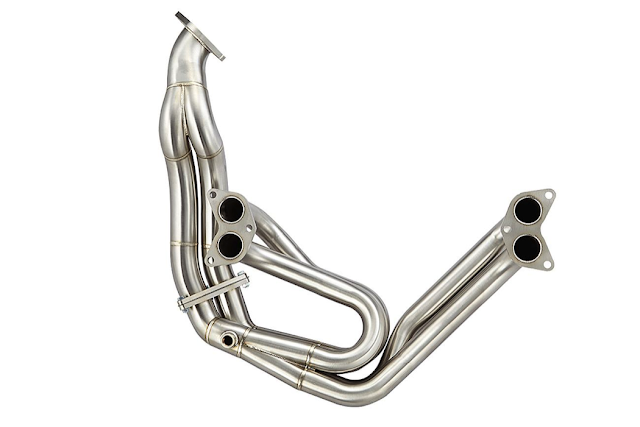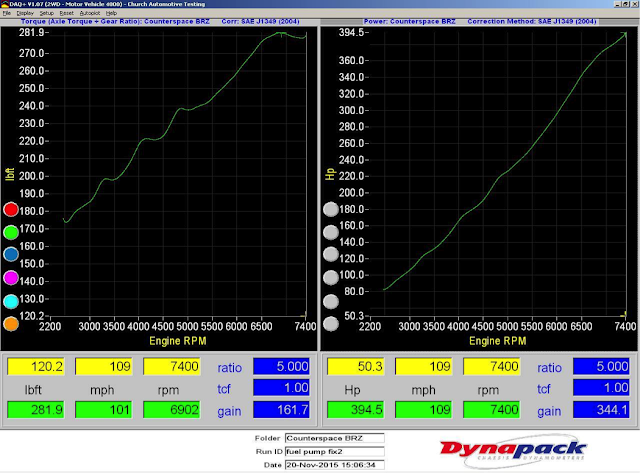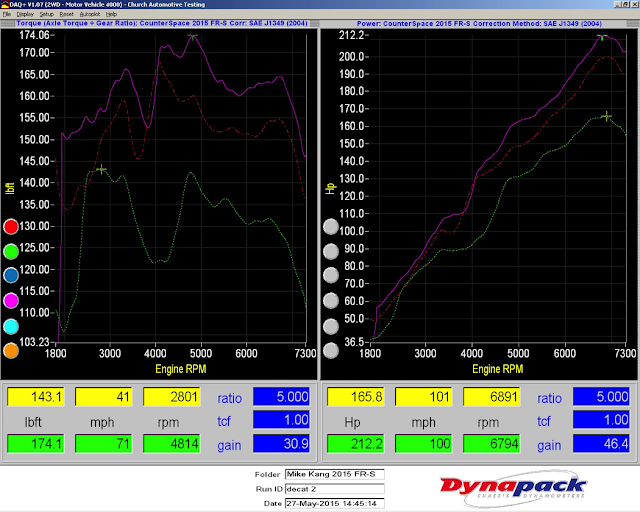The following performance dyno runs were
performed by Counter Space Garage (CSG)
First, we compared ACE 4-2-1 Type A 350 vs Stock
-
Orange – ACE 4-2-1 Type A 350 on
E70
-
Red – ACE 4-2-1 Type A 350 ACN
91
-
Green - Stock
Test notes:
- There is a gain of 10.8 lb/ft wtq, peak vs peak, on ACN 91
- There is a gain of 28.5 whp, peak vs peak, on ACN 91
- There is a gain of 22 lb/ft wtq, peak vs peak, on E70 vs stock
- There is a gain of 39 whp, peak vs peak, on E70 vs stock
Second, here is the same graph of the ACE 4-2-1 Type A 350 vs Stock, but
with the peak torque gain (maximum delta) highlighted
-
Orange – ACE 4-2-1 Type A 350
vs Stock
-
Red – ACE 4-2-1 type A 350 ACN
91
-
Green - Stock
Test notes:
- There is a peak gain of 30.4 lb/tq, on ACN 91
- There is a peak gain of 22whp at that same RPM, on CAN 91
- E70 gains speak for themselves over stock
Third, here is a graph of a leading UEL
header + OP combo, vs the ACE 4-2-1 Type A 350 Header + OP. Both setups have
been dyno tuned per our methodology. Peak power for CAN 91 is highlighted.
-
Orange – ACE 4-2-1 Type A 350
E70
-
Red – ACE 4-2-1 type A 350 ACN
91
-
Purple – UEL + OP E70
-
Blue – UEL + OP CAN 91
Test notes:
- The UEL makes more power from 2400-3150 on E70
- The UEL makes more power from 2450-2950 on CAN 91
- The ACE Header makes more power through the rest of the RPM range
on both E70 and CAN 91
Forth, the same graph as above, but with
E70 peaks highlighted.
Some followup thoughts from CSG
-
ACN91 is notoriously known as “pisswater”, because it is, literally, the worst
“premium” octane gasoline commonly available. Despite this, MUCH more timing
could be added with the ACE 4-2-1 Type A 350. This indicates to us that the ACE
4-2-1 Type A 350 is evacuating the exhaust gas out of the cylinders faster and
more completely then the OEM or UEL headers. Because we are able to add timing,
the 91 octane gains are larger compared to the other options.
-
However, for the very reason that 91 octane gains are larger, E70 gains are
even smaller. Ethanol allows you to add more timing, because it is both more
knock resistant, and has superior cooling properties, which are compounded by
the finer atomization of Direct Injection. Because we can already run so much
timing on CAN 91, Ethanol gains are lower.
-
Due to time and budget constraints, we elected to test E70, rather thean E85.
While E85 would certainly yield higher numbers, purging the system completely
enough to have E85 (instead of E84, or E82, ect.) would have been too time
consuming. We compromised by testing E70, which we could verify via our
Delicious Tuning Flex Fuel kit. Additionally, we believe these numbers to be
reasonably close to E85 numbers as Ethanol has diminishing returns as the
ethanol content goes up with Naturally Aspirated cars.
-
All testing was performed with an otherwise OEM car. We believe an aftermarket
front pipe will free up the exhaust flow even more, allowing for more gains.
This leads us to more testing next week; the ACE Type A 350 header will be
tested with multiple diameter front pipes to see if any of them produce better
results.
-
We are absolutely certain that even deleting the cat in the OEM front pipe will
yield more power. We are also of the belief that a properly matched front pipe
will probably flatten out the torque drop between 5000 and 6800 RPMs. This is
heavily reinforced by many dyno’s we’ve seen on other cars, including the fifth
dyno above, that shows the 5000-6800 range being flattened out when there are
no cats in the exhaust system. Any peak gains are just icing on the cake.
CSG follow-up dyno runs with Front Pipe variations:
First, ACE 4-2-1 type A 350 vs ACE 4-2-1 Type A 350 with Front Pipe
-
Dotted Red – ACE 4-2-1 type A
350 + ACE Front Pipe on ACN 91
-
Striped Red - ACE 4-2-1 type A
350 on ACN 91
Test notes:
- There is a gain of 13.8 lb/ft by adding the ACE front Pipe!
- Horsepower gains are only 5.5WHP. However, you can see a huge gain
in the area under the curve; there’s effectively a horsepower gain everywhere.
- The odd dip you see at 3700 RPM is not actually a dip. This is the
AVCS being unable to keep up with the RPMs as the revs are climbing up the
dyno. If we change the ramp rate, the dip will shift, based on how quickly you
go through the RPM band. In actuality, the dip is not manifested under street
driving conditions.
- 199.6WHP on CAN 91. This is a short 4th gear pull. As
you know, CSG does not do “hero” dynos. Just to see what we could be, by
altering *how* we performed the pull, we were able to make the dyno read 209whp
with CAN 91, but this is not representative of real world performance. This
199.6WHP is repeatable all day, every day, under heat soaked conditions, at the
track.
Second, here is the same test, but on E70
-
Solid Purple – ACE 4-2-1 type A
350 + ACE Front Pipe on E70
-
Striped Orange - ACE 4-2-1 type
A 350 on E70
Test notes:
- There is a gain of 8.6lb/ft torque
- There is a 7.7WHP
- As previously mentioned, you’ll notice that odd dip has shifted.
It’s not really there, as it’s a cam angle artifact from not being able to keep
up with the rate of RPM rise.
Third, we add stock to the graph, with ACN 91 results highlighted.
-
Dotted Green is stock on ACN 91
-
Striped Red is ACE 4-2-1 type A
350 + ACE Front Pipe on ACN 91
-
Solid Purple is ACE 4-2-1 type
A 350 + ACE Front Pipe on E70
Test notes:
- There is a peak gain of 45lb/ft torque at the wheels on ACN 91
- There is a peak gain of 33.8WHP at the wheels on ACN 91
Forth, we take the same graph and highlight E70 results.
-
Dotted Green is stock on ACN 91
-
Striped Red is ACE 4-2-1 type A
350 + ACE Front Pipe on ACN 91
-
Solid Purple is ACE 4-2-1 type
A 350 + ACE Front Pipe on E70
Test notes:
- There is a peak gain of 50lb/ft torque at the wheels on E70
- There is a peak gain of 46.4WHP on E70
Dyno graphs from independent sources
running an ACE Header:
Abbey
Motorsports-United Kingdom: Type A 250
Carl
Fredrik Wernboe – Sweden: Type A 350

Jordan
Best – USA: Type B 350
Alex
Jackson – USA: Type A 350 (with Jackson Racing Supercharger)
ace header e-force brz supercharge
| 





















